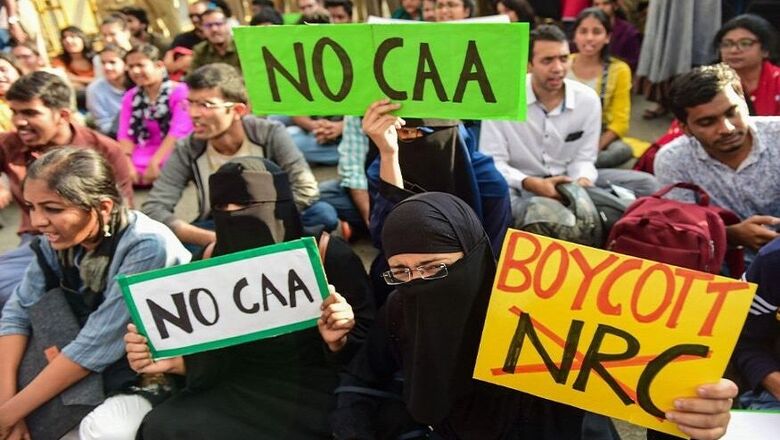
views
New Delhi: Defending the validity of the Citizenship Amendment Act (CAA), the central government has filed a 129-page counter-affidavit in the Supreme Court arguing against any judicial review of the contentious legislation and calling it "a necessary exercise". The government has argued that under the existing legal provisions it was "a necessary exercise for any sovereign country for mere identification of citizens from non-citizens".
The Centre’s arguments are mainly two-pronged: one that it is a limited legislative measure that will not impact any existing right of Indian citizens and, two, that there is limited scope of judicial review on matters of immigration and citizenship since they fall under the executive domain of a sovereign government.
The CAA was passed by the Parliament in December but has not been made operational yet in the face of fervent nationwide protests against what critics call a discriminatory law. The CAA makes it easier for religious minorities from three neighbouring Muslim-majority countries – Afghanistan, Pakistan and Bangladesh - who came to India before 2015 to get Indian citizenship - but not if they are Muslim.
Coupled with the National Population Register (NPR) and a proposed National Register of Citizens (NRC), India's Muslims, who form nearly 15% of the country's 1.3 billion population, fear the steps are aimed at marginalising them. They fear they could be disenfranchised, stripped of their nationality or their right to vote.
But the home ministry, in its affidavit, has argued the CAA won't affect the legal, democratic or secular rights of any Indian citizen and is only aimed at protecting certain classified communities in non-secular countries. “CAA is based not on religion but on religious persecution,” it says.
The affidvit was filed as a preliminary counter in response to the writ petitions filed in the Supreme Court against the CAA. In its 129-page affidavit filed by BC Joshi, a director in the Union Home Ministry, the government has argued the CAA does not violate legal, democratic or secular rights of any Indian citizen or the constitutional morality. It has also defended the exercise of NRC, which combined with the provisions of the CAA, has sparked a nationwide movement against the government.
The affidavit has been filed in response to nearly 150 petitions filed against the legislation in the top court.
"As per the exisiting statutory regime, there are three classes of residents in India - citizens, illegal migrants and foreigners on valid visa. It is therefore, the responsibility entrusted on the central government...to identify/detect illegal migrants and thereafter, follow the due process of law," states the affidavit accessed by News18.
It says as the matter relates to citizenship of the country, the said subject matter “may not be within the scope of judicial review and may not be justiciable”.
“Such decisions are the result of parliamentary legislative policy based upon the executive – foreign policy decision making for which constitutional courts may not have the requisite expertise to examine the parameters based upon which such legislative policy is enacted,” the government has told the SC.
A three-judge bench led by Chief Justice SA Bobde had sought the government’s response after the petitions were filed, but had refused to stay the operation of the Act in January.
The government has also said in its response that CAA does not stop or impinge upon the existing regime for obtaining citizenship of India by foreigners of any country.
“The legal migration, on the basis of valid documents and visa, continues to be permissible from all countries of the world including from the three specified countries,” the affidavit states.
It further argues that recognition of religious persecution in the particular neighbouring states “is actually a reinstatement of Indian ideals of secularism, equality and fraternity.”


















Comments
0 comment